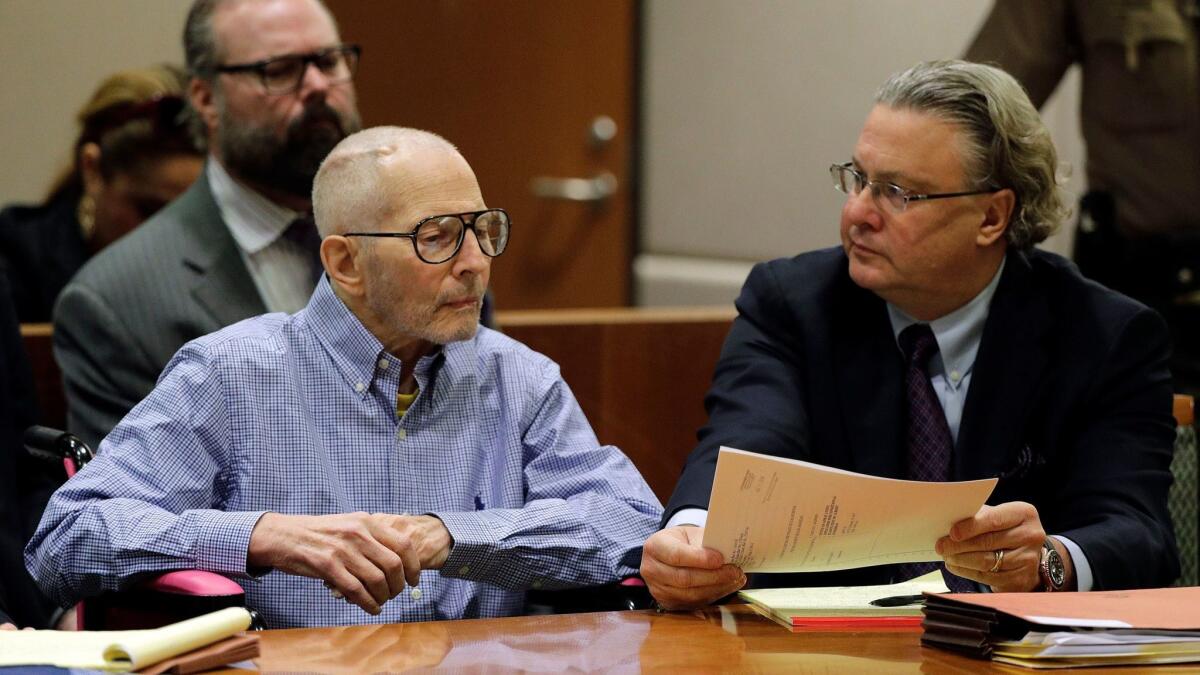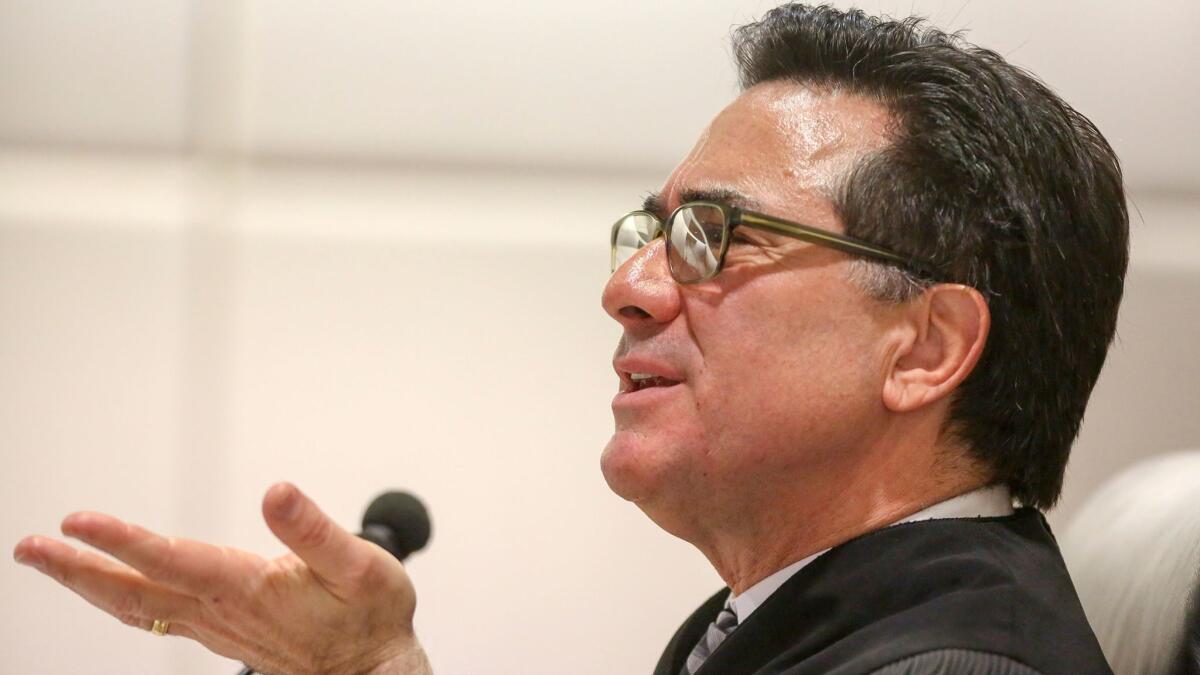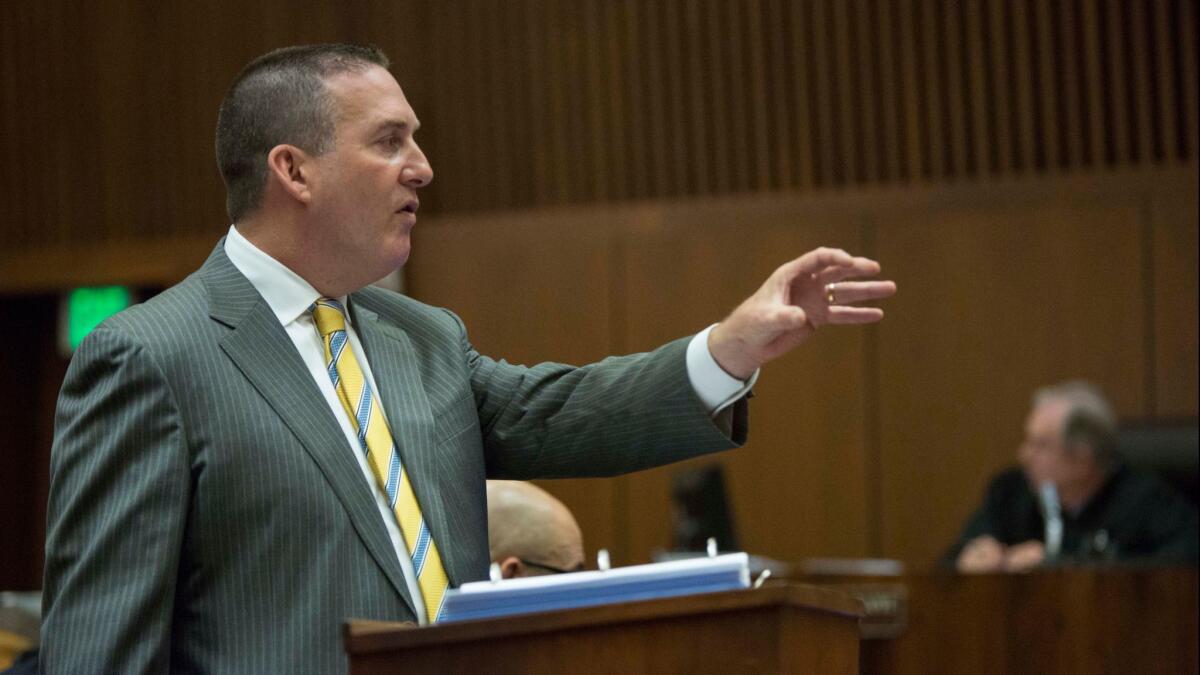Robert Durst’s murder case marked by acrimony and ugly confrontations between lawyers

- Share via
It’s a rivalry teetering on mutual disgust.
The battle between the prosecution and the high-priced legal team defending New York real estate scion Robert Durst in his Los Angeles murder case has frequently devolved into accusations of misconduct, incompetence, bullying and, after one ugly hallway confrontation between two of the attorneys, even slander.
For the record:
1:40 p.m. Feb. 26, 2018An earlier version of this article misstated the breed of the 170-pound dog that Lewin said slept in his bed with him. It was a Great Dane, not a basset hound.
Nothing is too small to bicker about. Not who should pay for a retired detective’s pet sitter while he testifies. Not who gets more minutes to talk in court.
The tension escalated earlier this month when Durst’s lawyers said they’re considering making a highly unusual request for the judge to remove one of the lead prosecutors, who has repeatedly clashed with the defense team.
Durst’s life and legal battles have long set the benchmark for bizarre. The multimillionaire born into a New York real estate empire disguised himself for a while as a mute woman in a blond wig while living in a $300-a-month apartment in Texas (Durst said he moved to escape media attention after New York authorities reopened an investigation into his first wife’s disappearance). While in Texas, Durst admitted to chopping up his neighbor’s body and dumping the parts into Galveston Bay (a jury acquitted him of murder). Years later, a security camera caught footage of him urinating on candy at a pharmacy near his Houston condo (his attorney attributed the “urgency in urination” to recent surgeries).
The drama has continued since Durst was extradited to Los Angeles about a year ago, but this time with the attorneys in the spotlight.
In the middle, trying to defuse the tension, is Superior Court Judge Mark E. Windham, a former defense attorney who often sounds like an annoyed-yet-slightly-amused schoolteacher trying to keep students on task.
“All right,” the judge asked the attorneys at a recent hearing, “can’t we all get along?”

A certain level of courtroom sparring between legal adversaries is routine — even intentional. A curt interruption, a well-timed sigh or a dramatic eye roll often serve as theatrics for a jury as much as genuine expressions of dislike for a rival. But in a court system where opposing attorneys more often exchange jokes than jabs, the Durst case has begun to rival some of L.A.’s most rancorous court battles.
In the 2013 civil trial over Michael Jackson’s death, an attorney refused to shake another’s hand and complained that his rival had flipped him off. And during O.J. Simpson’s televised murder trial more than 20 years ago, the country got an up-close view of the conflict between Marcia Clark and Robert L. Shapiro — a battle that devolved into requests for sanctions and a call to involve the State Bar.
Having a largely out-of-town defense team in the Durst cases probably exacerbates the drama, said Santa Clara University School of Law professor Gerald Uelmen, noting that the lawyers are less likely to face off again on another case in the future.
Uelmen, a member of Simpson’s defense team, characterized the bickering in that case as “a real disappointment.” At the start of the case, he recalled, the judge said, “I hope when this is all over we can all sit down to dinner and be friends.”
“It never happened,” Uelmen said.
The showdown in Durst’s case began three years ago, when he was arrested and charged with the murder of his best friend, Susan Berman, who was found dead in her Benedict Canyon home on Christmas Eve in 2000. Durst, now 74, was taken into custody by FBI agents in a New Orleans hotel, where authorities found guns, cash, a fake ID and an old-man mask.
I think we can all do a little bit better with decorum.
— Superior Court Judge Mark E. Windham to attorneys on the Robert Durst case
Before Durst had met with his attorneys, Deputy Dist. Atty. John Lewin — a prosecutor who specializes in handling cold cases — interviewed him for nearly three hours, asking questions about his childhood and about Berman. The prosecutor often built up to his questions by sharing personal tidbits with Durst — his 170-pound Great Dane sleeps in bed with him, his wife tells him he’s “pushing obese,” and he, like Durst, doesn’t have good hearing.
But Lewin also asked direct questions, at one point saying, “If you had killed Susan, would you tell me?”
“No,” Durst replied.
Soon after the interview, Durst’s lawyers filed court papers criticizing Lewin’s interrogation as “improper and deceptive.” Prosecutors defended the interview, saying Durst hadn’t been charged with Berman’s murder at the time and “voluntarily” waived his Miranda rights.
The accusation of misconduct, which he called “slanderous,” exasperated Lewin, who brought it up at a hearing in April.
“For the 75th time they’ve alleged I committed misconduct,” Lewin said. “I’ve had it with the allegations. Either put up or shut up!”
The prosecutor also complained that defense attorneys had improperly filed a motion for a delay, adding that “maybe they shouldn’t be practicing” law.
At the defense table, David Chesnoff — a tall, barrel-chested Las Vegas attorney whose long list of celebrity clients includes Paris Hilton, Martha Stewart and Shaquille O’Neal — shook his head.
“This guy’s nuts,” he muttered.
The judge tried to soothingly reassure Lewin that he had “a fine reputation,” encouraging the prosecutor not to let the issue “get under your skin.”

At another hearing in July, Lewin questioned Emily Altman, a longtime friend of Durst. The prosecutor grew increasingly agitated with the witness, who often answered his questions with “I don’t know” and backtracked on bombshell testimony. Altman cried on the stand and said she wanted to go home — a rather consistent theme among witnesses. (A friend of Berman who took the stand said she’d rather have her teeth drilled all day.)
Under cross-examination by one of Durst’s lawyers, Altman — whom the judge deemed as a “hostile witness,” saying she identified more closely with the defense — said she felt bullied by Lewin. At one point, Windham leaned into his microphone and took a loud, deep breath. Everyone else, he suggested, should follow his lead.
“I think we can all do a little bit better with decorum,” the judge later added.
The friction peaked at a hearing a month later where Lewin turned to Chesnoff and asked why he was staring at him.
“Keep staring,” Lewin said, lifting his eyebrows. “Keep it up.”
Moments later, Chesnoff muttered, seemingly to himself, but loud enough to be heard: “I’m going to bust his balls now.”
During a break later that day, screaming could be heard in the hallway. When Chesnoff walked back into the courtroom, he was shaking his head. Lewin returned a few minutes later, red-faced.
“That’s slander, John. ...You came screaming at me in the hallway,” Chesnoff said to Lewin, adding that the prosecutor had made a comment in front of law students about Chesnoff committing a sex act.
“I made a joke,” Lewin said.
Deputy Dist. Atty. Habib Balian — another prosecutor on the case whose low-key, self-deprecating style often helps defuse strained moments — put his hand on Chesnoff’s back.
“I think tensions run high,” Balian said.
Moments later, Lewin and Chesnoff apologized to each other.
When asked about the back-and-forth recently, Chesnoff declined to comment. Lewin said he has endured “repeated personal attacks on what I have done as a lawyer.”
“Obviously, as lawyers, we are human beings,” he said, “and sometimes in the heat of battle things will be said, which, in hindsight, were better left unstated.”
Durst, who listens to the hearings using noise-amplifying earphones, generally appears unfazed by the wrangling.
In a recent court filing, his attorneys returned to Lewin’s jailhouse interview of Durst in New Orleans, characterizing it as an example of prosecution “trickery.” Explaining why they may eventually ask Windham to recuse Lewin, the lawyers criticized the prosecutor’s style of interviewing witnesses, saying he “berated” them and asked leading questions that drew inaccurate answers.
Prosecutors filed a motion calling any request to recuse Lewin “frivolous,” noting that the defense hasn’t identified conduct “that would justify such a rarely used and extraordinary sanction.”
In court, Lewin expressed frustration, telling the judge he believed the defense lawyers hadn’t properly supported their arguments with the correct legal citations. If the prosecution filed such a motion, Lewin said, he believed the judge would “come down on us like a ton of bricks.”
The judge raised his eyebrows, smirked and sipped from his mug.
Moments later, Windham ruled that Durst’s 6th Amendment right to counsel hadn’t been violated during the interview by Lewin.
The courtroom discussion then shifted to the timing of Durst’s preliminary hearing, which is slated for April 16. It was previously scheduled for last October but was pushed back to accommodate the Houston-based members of Durst’s defense team who sustained damage to their homes and offices during Hurricane Harvey.
One of them, Dick DeGuerin, told the judge he would soon be starting a federal trial in Texas. Moments later, Lewin added that he hadn’t learned about the potential conflict in DeGuerin’s schedule from the attorney, but from monitoring DeGuerin’s caseload online.
“I have to track him,” Lewin said, “like I’m hunting coyotes.”
For more news from the Los Angeles County courts, follow me on Twitter: @marisagerber
More to Read
Sign up for Essential California
The most important California stories and recommendations in your inbox every morning.
You may occasionally receive promotional content from the Los Angeles Times.














